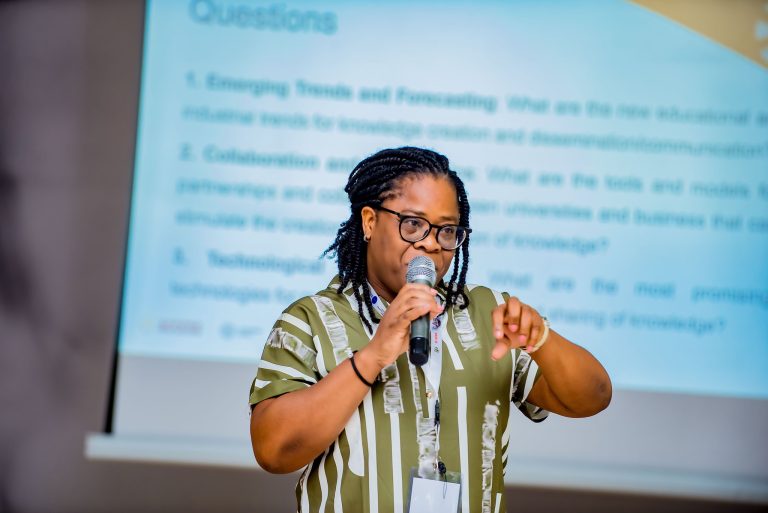The ACCESS Summer School 2024 continued its stride with practical sessions, hosting workshops and presentations on projects and best practices in both Kigali and at the INES Campus in Ruhengeri on February 6th and 7th.

A first workshop session on the role of universities and industry in knowledge creation and dissemination, moderated by Maroua Chérif from ACCESS Tunisia and Robertson Klaingar from ACCESS Benin, guided participants from the seven partner countries in the ACCESS network through a world café discussion. The focus was on exploring models and mechanisms for university-business linkages, aiming to enhance the skills of academic staff and students while bolstering the employability of university graduates transitioning into the workforce.

In groups, participants delved into various themes related to the workshop’s overarching theme. The impact of emerging technologies like artificial intelligence and digital tools on education and industry was a prominent topic, with emphasis placed on the necessity for adaptability in this rapidly evolving landscape. Additionally, participants explored successful collaboration models between universities and businesses, including internship placements, service learning, and project work. They stressed the importance of embedding these models into university curricula to provide students with practical, real-world experience throughout their studies. The discussion culminated in an examination of the significance of fostering a culture of innovation within academia and industry. Mentorship and networking emerged as vital components in nurturing creativity and driving forward-thinking initiatives.
- All

Robert Meyer (ACCESS Coordinator - Leipzig University)

Sandy Adam (ACCESS Coordinator - Leipzig University)

Group session
In a follow-up workshop moderated by Bismark Agyei Yeboah, Robert Meyer and Sandy Adam from the ACCESS Leipzig team and facilitated by the ACCESS coordinators from the partner universities, participants collaborated on project proposals submitted to the 2023 University of Ideas competition, focusing on skills development, career advancement, and university-business collaboration within the ACCESS network. During the initial phase, attendees worked in teams to refine their concepts and establish a project timeline. They became acquainted with the project canvas technique, using it to enhance their ideas and streamline the implementation process.
On the second day of the workshop, each proposal was showcased to the Summer School Rwanda 2024 attendees. A total of 13 innovative ideas were presented, spanning virtual internships, the integration of augmented and virtual reality to enrich student learning experiences, and the reinforcement of alumni networks. The overarching goal of this year’s University of Ideas competition is to foster the integration and dedication of ACCESS core initiatives within the affiliated network across partner countries.
- All


The competition serves as a platform to unearth and champion inventive concepts, frameworks, and strategies that promote novel teaching and learning methodologies within Higher Educational Institutions (HEIs). These initiatives emphasize the utilization of technology and digital tools to enhance education, forge stronger University-Business Linkages (UBL), and bolster Career Enhancement (CE) opportunities. Ultimately, the aim is to enhance the employability of students and graduates, with a particular focus on Africa.
The event is funded by the DAAD (German Academic Exchange Service) with financial support from the Federal Ministry of Economic Cooperation and Development (BMZ).